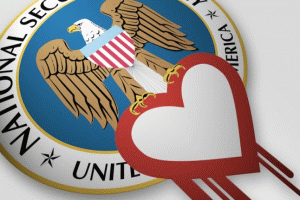Lavaboom builds encrypted webmail service to resist snooping
 A new webmail service called Lavaboom promises to provide easy-to-use email encryption without ever learning its users’ private encryption keys or message contents.
A new webmail service called Lavaboom promises to provide easy-to-use email encryption without ever learning its users’ private encryption keys or message contents.
Lavaboom, based in Germany and founded by Felix Müller-Irion, is named after Lavabit, the now defunct encrypted email provider believed to have been used by former NSA contractor Edward Snowden.
Lavabit decided to shut down its operations in August in response to a U.S. government request for its SSL private key that would have allowed the government to decrypt all user emails.
Read moreNSA knew about the Heartbleed vulnerability two years ago
 The NSA knew about and exploited the Heartbleed vulnerability for two years before it was publicly exposed this week, and used it to steal account passwords and other data.
The NSA knew about and exploited the Heartbleed vulnerability for two years before it was publicly exposed this week, and used it to steal account passwords and other data.
Speculation had been rampant this week that the spy agency might have known about the critical flaw in OpenSSL that would allow hackers to siphon passwords, email content and other data from the memory of vulnerable web servers and other systems using the important encryption protocol. That speculation appears to be confirmed by two unnamed sources who told Bloomberg that the NSA discovered the flaw shortly after it was accidentally introduced into OpenSSl in 2012 by a programmer.
Read moreWireless Networks on US planes monitored by NSA
 Companies that provide WiFi on US domestic flights are handing over their data to the NSA, adapting their technology to allow security services new powers to spy on passengers. In doing so, they may be in violation of privacy laws.
Companies that provide WiFi on US domestic flights are handing over their data to the NSA, adapting their technology to allow security services new powers to spy on passengers. In doing so, they may be in violation of privacy laws.
In a letter leaked to Wired, Gogo, the leading provider of inflight WiFi in the US, admitted to violating the requirements of the Communications Assistance for Law Enforcement Act (CALEA). The act is part of a wiretapping law passed in 1994 that requires telecoms carriers to provide law enforcement with a backdoor in their systems to monitor telephone and broadband communications.
Read moreBerlin finds Washington’s assurances on NSA spying 'insufficient'
 A leading ally of Angela Merkel has critically responded to the US government to provide adequate guarantees on its spying tactics. The expectations of making some progress in the bilateral talks have been set to the next month as the German leader visits Washington.
A leading ally of Angela Merkel has critically responded to the US government to provide adequate guarantees on its spying tactics. The expectations of making some progress in the bilateral talks have been set to the next month as the German leader visits Washington.
According to the classified information, provided last October by the whistleblower Edward Snowden, US intelligence agents were able "to bug” Ms. Merkel’s mobile phone from a listening post on the US Embassy roof. This caused outrage in Germany, where any surveillance actions are particularly sensitive because of the link to the East German Stasi secret police and the Nazis.
Read moreWashington plans to ban the NSA to collect metadata about phone calls
 President Barack Obama plans to ask Congress to end the bulk collection and storage of phone records by the National Security Agency but allow the government to access the "metadata" when needed, a senior administration official said on Monday.
President Barack Obama plans to ask Congress to end the bulk collection and storage of phone records by the National Security Agency but allow the government to access the "metadata" when needed, a senior administration official said on Monday.
If Congress approves, the Obama administration would stop collecting the information, known as metadata, which lists millions of phone calls made in the United States. The practice triggered a national debate over privacy rights when the extent of the surveillance program was exposed last year by former NSA contractor Edward Snowden.
Read moreNSA surveillance program records 'every single' phone call in one country
 U.S. secret services developed a spy program, capable of recording 100% of each and every phone call across entire nations. The Washington Post shares another bit of classified information referring to secret documents supplied by former NSA contractor Edward Snowden.
U.S. secret services developed a spy program, capable of recording 100% of each and every phone call across entire nations. The Washington Post shares another bit of classified information referring to secret documents supplied by former NSA contractor Edward Snowden.
Previously reported surveillance system could track phone numbers, times and duration of calls. Now, MYSTIC is used to intercept phone conversations in one specific country, storing audio data for 30 days.
This NSA program dates to 2009, when by 2011 its RETRO tool, short for “retrospective retrieval”, was ready to be rolled-out at full capacity. Program's senior managers compared MYSTIC to a time machine, meaning voices from any call can be replayed without requiring the NSA to identify a person for surveillance in advance.
Read moreNSA surveillance program reaches ‘into the past’ to retrieve, replay phone calls
 The National Security Agency has built a surveillance system capable of recording “100 percent” of a foreign country’s telephone calls, enabling the agency to rewind and review conversations as long as a month after they take place, according to people with direct knowledge of the effort and documents supplied by former contractor Edward Snowden.
The National Security Agency has built a surveillance system capable of recording “100 percent” of a foreign country’s telephone calls, enabling the agency to rewind and review conversations as long as a month after they take place, according to people with direct knowledge of the effort and documents supplied by former contractor Edward Snowden.
A senior manager for the program compares it to a time machine — one that can replay the voices from any call without requiring that a person be identified in advance for surveillance. On Jan. 17, President Obama called for significant changes to the way the NSA collects and uses telephone records of U.S. citizens.
Read moreEdward Snowden urges web privacy and has no regrets
 Edward Snowden urged the technology community to take essential strides in securing and defending the online web privacy of users and tells he has no past regrets on Monday, March 10, 2014.
Edward Snowden urged the technology community to take essential strides in securing and defending the online web privacy of users and tells he has no past regrets on Monday, March 10, 2014.
National Security Administration (NSA) whistle-blower joined and spoke publicly for the first time to the crowd of 3,500 at the South by Southwest conference in Austin, Texas, from Moscow, Russia, via Google hangout. After releasing the top official secret documents of the United States government, former NSA contractor escaped from US in June 2013, and took a refuge in Russia. He told that the online web communication protection from snoops is responsibility of the tech-savvy group. Extreme intrusion and collection of data by the CIA is unessential.
Read moreNSA Ordered by Judge to Preserve Phone Records It Collected
 The National Security Agency was blocked by a judge from carrying out plans tomorrow to begin destroying phone records collected for surveillance after a privacy group argued they are relevant to lawsuits claiming the practice is unconstitutional.
The National Security Agency was blocked by a judge from carrying out plans tomorrow to begin destroying phone records collected for surveillance after a privacy group argued they are relevant to lawsuits claiming the practice is unconstitutional.
U.S. District Judge Jeffrey White in San Francisco ordered the agency today to retain the records and scheduled a hearing for March 19 on whether they can be destroyed. The NSA had planned to dispose of the records following a March 7 ruling by the U.S. Foreign Intelligence Surveillance Court in Washington.
Read moreFacebook's CEO about NSA spy scandal
 Mark Zuckerberg crusade to connect another billion people to the Internet, but US government's spy scandal last year make these efforts more difficult, said Facebook’s CEO during an interview at the Mobile World Congress trade show in Barcelona, Spain.
Mark Zuckerberg crusade to connect another billion people to the Internet, but US government's spy scandal last year make these efforts more difficult, said Facebook’s CEO during an interview at the Mobile World Congress trade show in Barcelona, Spain.
Journalist David Kirkpatrick, known for his book "The Facebook Effect" (2010) asked how the leaked documents from the Edward Snowden, former government contractor, jeopardise Facebook and other Internet giants. The companies were accused of providing US National Security Agency unfettered access to their servers. Most likely this scandal has affected company's reputation and its business relations and communications internationally.
Read moreAxarhöfði 14,
110 Reykjavik, Iceland















